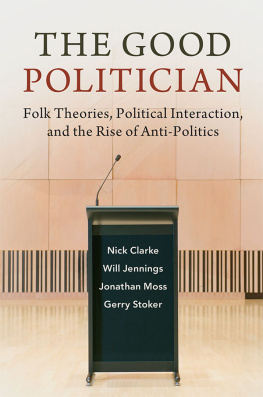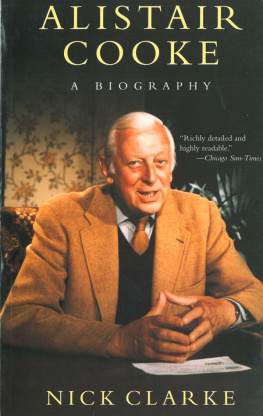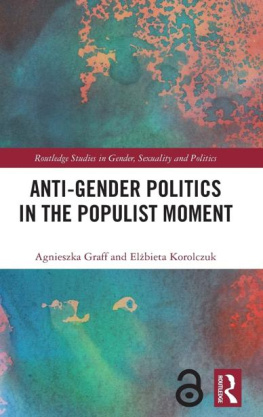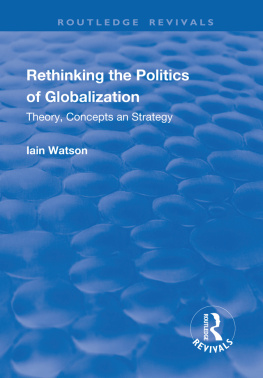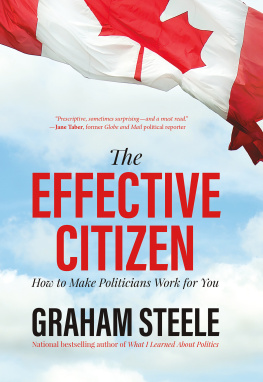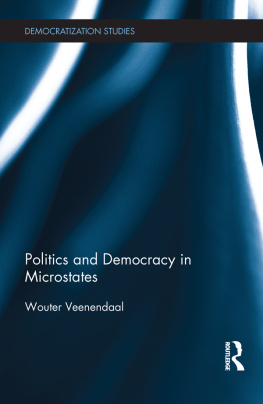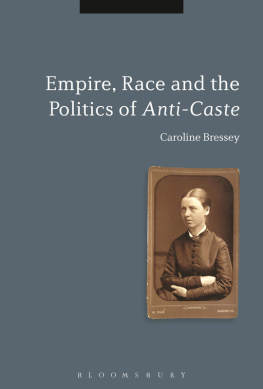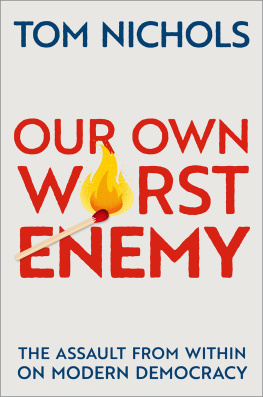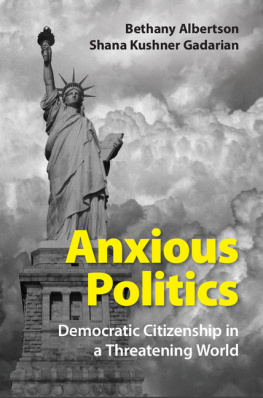Surveys show a lack of trust in political actors and institutions across much of the democratic world. Populist politicians and parties attempt to capitalise on this political disaffection. Commentators worry about our current age of anti-politics. Focusing on the United Kingdom, using responses to public opinion surveys alongside diaries and letters collected by Mass Observation, this book takes a long view of anti-politics going back to the 1940s. This historical perspective reveals how anti-politics has grown in scope and intensity over the last half-century. Such growth is explained by citizens changing images of the good politician and changing modes of political interaction between politicians and citizens. Current efforts to reform and improve democracy will benefit greatly from the new evidence and conceptual framework set out in this important study.
Nick Clarke is Associate Professor of Human Geography at the University of Southampton.
Will Jennings is Professor of Political Science and Public Policy at the University of Southampton.
Jonathan Moss is Lecturer in Politics at the University of Sussex.
Gerry Stoker is Centenary Professor of Governance at the University of Canberra and Professor of Governance at the University of Southampton.
University Printing House, Cambridge CB2 8BS, United Kingdom
One Liberty Plaza, 20th Floor, New York, NY 10006, USA
477 Williamstown Road, Port Melbourne, VIC 3207, Australia
314321, 3rd Floor, Plot 3, Splendor Forum, Jasola District Centre, New Delhi 110025, India
79 Anson Road, #0604/06, Singapore 079906
Cambridge University Press is part of the University of Cambridge.
It furthers the Universitys mission by disseminating knowledge in the pursuit of education, learning, and research at the highest international levels of excellence.
www.cambridge.org
Information on this title: www.cambridge.org/9781316516218
DOI: 10.1017/9781108641357
Nick Clarke, Will Jennings, Jonathan Moss and Gerry Stoker 2018
This publication is in copyright. Subject to statutory exception and to the provisions of relevant collective licensing agreements, no reproduction of any part may take place without the written permission of Cambridge University Press.
First published 2018
Printed in the United Kingdom by Clays, St Ives plc
A catalogue record for this publication is available from the British Library.
Library of Congress Cataloging-in-Publication Data
Names: Clarke, Nick, 1974 author. | Jennings, Will, author. | Moss, Jonathan, author. | Stoker, Gerry, author.
Title: The good politician : political interaction and the rise of anti-politics / Nick Clarke, University of Southampton, Will Jennings, University of Southampton, Jonathan Moss, University of Southampton, Gerry Stoker, University of Southampton.
Description: New York : Cambridge University Printing House, [2018] | Includes bibliographical references and index.
Identifiers: LCCN 2017053784 | ISBN 9781316516218
Subjects: LCSH: Political participation. | Apathy Political aspects.
Classification: LCC JF799 .C6 2018 | DDC 323/.042dc23
LC record available at https://lccn.loc.gov/2017053784
ISBN 978-1-316-51621-8 Hardback
ISBN 978-1-108-45981-5 Paperback
Cambridge University Press has no responsibility for the persistence or accuracy of URLs for external or third-party internet websites referred to in this publication and does not guarantee that any content on such websites is, or will remain, accurate or appropriate.
Contents
Figures
Tables
Preface: The Long Road to 2016, Brexit, and Trump
We began the research project behind this book in 2014, focused on the period since 1945 a widely recognised milestone for British politics. We were especially interested in what we call anti-politics: citizens negative sentiment regarding formal politics, with formal politics describing that set of activities and institutions required for collective and binding decision-making in plural societies (i.e. tolerating, canvassing, negotiating, compromising, and their institutionalisation in politicians, parties, elections, parliaments, governments). We were interested in the claim, often made, that political disaffection has grown over time in many democracies, such that compared to the period following the Second World War we are now living through an age of anti-politics. We were interested in testing this claim using the case of the United Kingdom (UK), for which good evidence is perhaps uniquely available in the form of public opinion surveys but also letters and diaries collected by Mass Observation (MO), all dating back to the late 1930s.
As our project continued, we realised that another milestone for British politics may have been reached in 2016. Brexit British exit from the European Union (EU), decided by a referendum in June 2016 marks a turning point in the process of European institution-building that began soon after the Second World War. Across the Atlantic, a milestone for American politics may also have been reached in 2016. Donald Trump became the first US President with no experience of military service or government, whether elected or appointed. Also worth noting here is the rise of populism across Europe. By 2015, parties aligning themselves with the people against the political class had gained at least 10 per cent of the vote in twenty European countries. In five of these countries Greece, Hungary, Italy, Slovakia, and Switzerland such parties had become the largest party. Also worth noting here is the electoral success of Pauline Hansons One Nation party in Australia, where Hanson and three colleagues became Senators in the federal election of 2016. In short, this book may draw on British evidence, for the most part, but its themes are relevant to the dynamic of democracies across much of the contemporary world.
Let us consider some of these recent events in a little more detail. There are many ways to interpret Brexit, but one way is to view it as a consequence of the long-term increase in citizens political disaffection we describe and explain in this book. Leave advocates campaigned against the need for politics at the European scale. The campaign against the EU was closely associated with the United Kingdom Independence Party (UKIP), which over the years has campaigned against much of politics at the national scale too. Here is Nigel Farage, then leader of UKIP, speaking on the morning of the referendum result (24 June 2016):
Dare to dream that the dawn is breaking on an independent United Kingdom this will be a victory for real people, a victory for ordinary people, a victory for decent people. We have fought against the multinationals. We have fought against the big merchant banks. We have fought against big politics. We have fought against lies, corruption, and deceit. And today, honesty, decency, and belief in nation, I think now is going to win. And we will have done it without having to fight, without a single bullet being fired.

